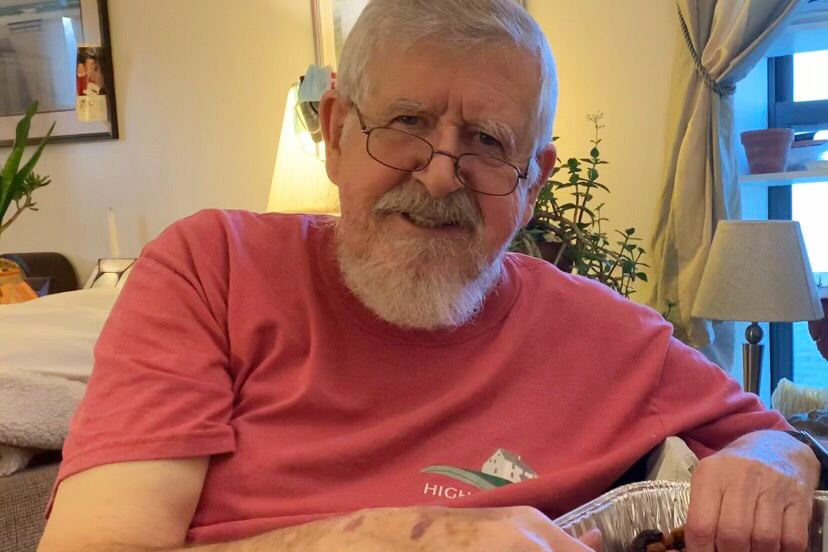While February is American Heart Month, maintaining your overall cardiovascular health includes finding ways for stroke prevention too.
Just ask Robert Lee, 80, of Canton, a recent stroke survivor who beat the odds and is already on his way to preventing future strokes thanks to UConn Health’s innovative care.
For years Lee’s been living with severely blocked carotid arteries in his neck that doctors always warned him were too risky and that he was too old for surgical intervention. As a result, he’s lived with the fear that someday a big stroke may strike.
Well this summer a major stroke did indeed strike Lee due to his right carotid artery being 100 percent clogged, and his left neck artery being 83 percent narrowed.
“I am very lucky a past stroke was minor but enough that it took my right eye’s sight permanently,” says Lee. “When this stroke occurred I initially couldn’t move my whole side of my body, from my face down to my toes.”
But after calling 9-1-1 at 4:00 a.m. immediate help for Lee was standing by at UConn John Dempsey Hospital where he was whisked from the ambulance to the Emergency Department’s CT Scan imaging suite to assess him for stroke and rapid follow up care needs.
“Believe it or not 10-12 professionals in middle of the night were standing around me roaring to go and help me,” says Lee. “These are God’s angels at UConn Health.
“And then you find a doctor at UConn Health like Dr. Mina Boutrous to convince me and my daughter that there was actually in fact something we could do to unclog my carotid arteries and prevent future strokes. We booked the procedure right away.”
This August Lee successfully received a new minimally invasive procedure called TCAR to unblock his severely narrowed left carotid artery and to restore proper blood flow and prevent future strokes and blindness in his other eye where he was already experiencing blurred vision.
TCAR (transcarotid artery revascularization), for high-risk carotid artery disease patients, is an innovative and least invasive approach which works by redirecting blood flow during carotid artery stenting to minimize a high-risk surgery patient’s risk of a stroke.
“The first thing I noticed post-TCAR procedure was that my severe headaches and pain were a thing of the past, and my remaining vision was nowhere near as blurry. I now can read the television screen again without the volume blaring. Now that’s awesome results.”
His message to other older adults like him who are told there is nothing that can be done about their dangerously blocked carotid arteries: “Don’t give up!” There is now a procedure called TCAR and I recommend that you do it!
“My doctor told me if I had another stroke there was a good chance I may not have another lucky survival. I am so glad I found a way with the help of Dr. Boutrous at UConn Health.”
A few months post-procedure Lee reports he’s doing well.
“I feel pretty darn good. It really worked out well and I am doing good,” says Lee. “Your blocked carotid arteries can be taken care of. Just listen to the doctors and learn how. It worked for me and can work for you. Don’t be afraid, especially you older people like me.”
Lee reminds everyone to keep their risk of stroke as low as possible too.
“Remember a lot of stuff can clog up your arteries,” says Lee who reports having drank a lot of beer in his youth and past, and also not previously worrying about his diet too much such as salt intake. He also in his 60s had heart blockages develop that needed artery stenting and eventually open heart surgery repair.
Thanks to Boutrous’ innovative care Lee is grateful to be back spending time with his children and grandchildren, tending to his love of plants, baking, and cooking.
“I have my life back, even at this time of a pandemic,” stresses Lee.
“It was very rewarding to help Mr. Lee lower the risk of future stroke and blindness,” said Dr. Mina Boutrous, assistant professor in the Department of Surgery’s Division of Vascular and Endovascular Surgery. “Thanks to TCAR innovation we are now able to successfully perform this minimally invasive procedure on patients who ordinarily wouldn’t be candidates for carotid artery surgery such as the most fragile, older adults. In addition to being potentially lifesaving, TCAR has been shown to help reduce stroke risk and improve quality of life.”
Boutrous is currently working toward making UConn Health a designated center of excellence for TCAR.



